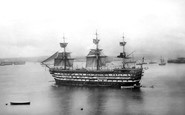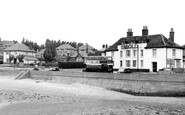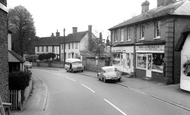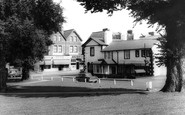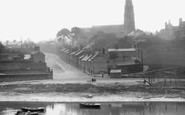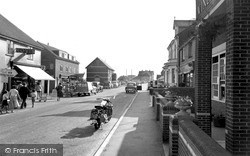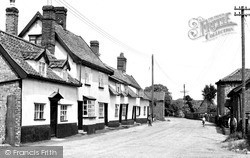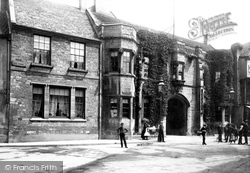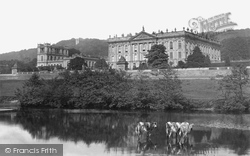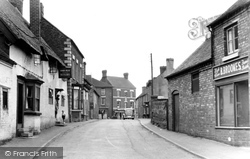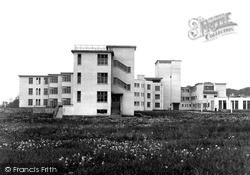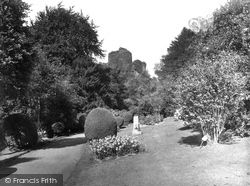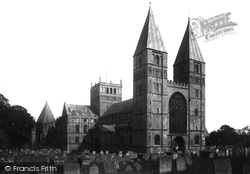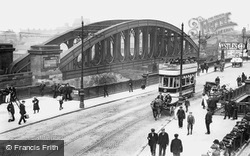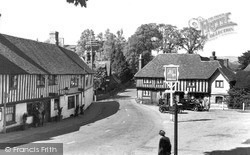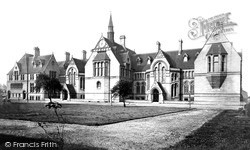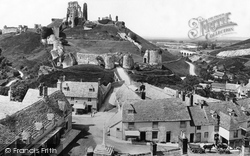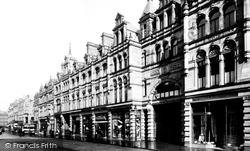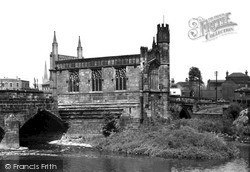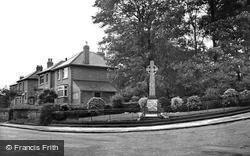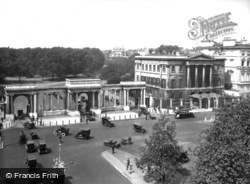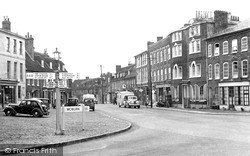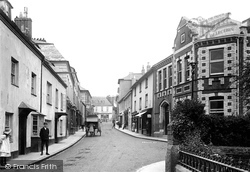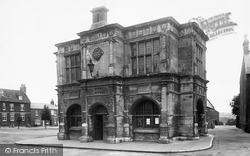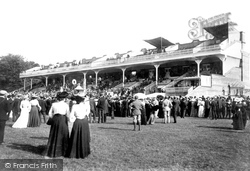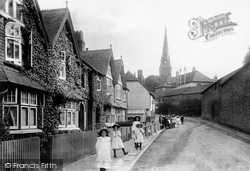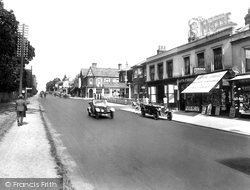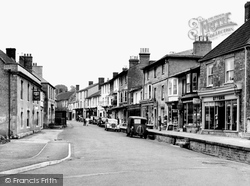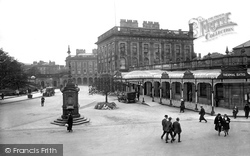Places
9 places found.
Those places high-lighted have photos. All locations may have maps, books and memories.
Photos
89 photos found. Showing results 201 to 89.
Maps
161 maps found.
Books
2 books found. Showing results 241 to 2.
Memories
224 memories found. Showing results 101 to 110.
Growing Up In Moniaive 1954 1969
I was born and brought up in Moniaive, and my mother owned the local hairdresser's salon (JACIE'S) at 3 Ayr Street. I lived with my mother (Janet), sister (Jenny) and maternal grandparents (who also had a house in ...Read more
A memory of Moniaive in 1954 by
Hms Imgregnable
My Great Great Grandfather Frederick George Rivers served and trained on this ship from 1886 to 1887, and trained on another 5 ships in Devonport between 1881 and 1891. Including HMS Duke of Wellington, HMS Rupert and HMS Northampton. He served on his first ship at the age of 16.
A memory of Devonport in 1880 by
Old Memories
I was born in Spring Hill nursing home in 1933, corner of Hill Lane and Howard Road, and I used to take short cuts via the bomb site on the way to school, sometimes I would find a coin or two. We lived near the Dell football ground ...Read more
A memory of Southampton in 1944 by
Family History
My ancestors owned this public house in the late 18th century. Prior to this they were tenants of the Duke of Bristol and the head of the household was the ferryman. He was mentioned in a letter to the Duke from a disgruntled ...Read more
A memory of Shotley Gate by
Born In Gt Waltham 1953
My father Eric Grubb was one of three sons and two daughters of George Grubb. (who lived until he was 100 years old). We lived in Six Bells Cottages until we were rehoused in Cherry Garden Road. My mum Gertrude worked ...Read more
A memory of Great Waltham by
William Leech Gun Maker 1796 1948 Still Trading
William Leech moved from St Martins in the Field, London to 20 Duke Street, Chelmsford in 1794. There he started up his gun maker's shop. Later he moved to 3 &4 Tindale Street, Chelmesford. ...Read more
A memory of Chelmsford by
Duke's Head, Wallington Green
I lived just behind the Duke's Head from 1945 till the late 60's, and I believe this was where my parents met before World War II. My dad was working as a part time barman and my mother was sent by my grandmother to ...Read more
A memory of Wallington by
Happiness And Memories
I used to attend St. Marys without the walls church service every Sunday and eventually in 1956 got married there by the Rev. Digby Thomas. My Father had been a choir boy in that church many years before, having lived in ...Read more
A memory of Chester in 1950 by
Enfield In The 60s
I can remember walking through Enfield Town as a young boy The Town then had shops like Ketts The electrical shop that sold Radios, Portable Reel to Reel taperecorders, Radiograms, and Record players , then left of that was ...Read more
A memory of Enfield by
Student Days
I, like many others, spent my student days at Matlock College of Education. The two main campuses and halls of residence were Rockside Hall and Chatsworth Hall, two magnificent buildings. From my bedroom I could see Riber Castle up on ...Read more
A memory of Matlock in 1965 by
Captions
379 captions found. Showing results 241 to 264.
There was nothing at Pevensey Bay when Duke William landed there on 28 September 1066, and it remained empty of habitation for many years .
This is taken from outside the Duke William. The roofline and dormer windows of the cottage on the left have subsequently been altered.
The Angel Hotel is a remarkable late 15th-century stone-built inn, rebuilt on the site of a Knights Templar hostel where King John had held court in 1213; in this building Richard III signed the Duke of
Begun by William Cavendish, fourth Earl and later first Duke of Devonshire in 1687, the House was completed in 1706. The north wing was added between 1820-30.
One of the few thatched buildings in the area, the Duke's Head is no longer a public house.
Sully Hospital was officially opened in 1936 by HRH the Duke of York.
Following the move of the gaol and assizes to Bodmin in 1842, the grounds were landscaped and turned into a pleasure park by the Duke of Northumberland.
Southwell is a Norman church built on the site of a Saxon minster founded in AD956 on land given to Oscytel, Archbishop of York, by King Eadwig.
It was replaced by a new Wearmouth Bridge, officially opened by HRH the Duke of York in 1929. Just beyond is the North Eastern Railway's bridge over the Wear.
Local legend has it that the Duke of Northumberland was imprisoned here after the discovery of the Gunpowder Plot.
The new college buildings were officially opened by the Duke of Devonshire in October 1873. The buildings pictured here are still extant; they are hidden from the main road by later buildings.
Henry VIII awarded Russell Woburn Abbey as a reward for service, and his descendants became Dukes of Bedford.
The official opening was conducted by the Duke and Duchess of York, whose arrival was met by a 21-gun salute.
This 14th-century chapel was built on the bridge as a memorial to Richard, Duke of York, who was killed at Wakefield.
The land was on the Duke of Norfolk's estate - at one time he was the country's richest man.
It was bought by the Duke of Wellington in 1817 and here were held glittering banquets celebrating the victory at Waterloo until his death in 1852.
The second time it was rebuilt with the benevolent assistance of the Duke of Bedford, a fact that is reflected in the open aspect of its modern layout and the quality of the Georgian facades on the
Ancient Lostwithiel was once the capital of Cornwall, and on a slope above the town are the ruins of the 12th-century Restormel Castle, owned by the Dukes of Cornwall.
A market charter was granted by King John in 1204. The Market Hall in the town centre was designed by William Grumbald. Work began in 1577, but the building remained unfinished until 1895.
The racecourse opened in 1801 after the Duke of Richmond gave part of his estate, Goodwood Park, to establish a track where members of the Goodwood Hunt Club and officers of the Sussex Militia could
The spire of St Mary's church soars above the town, and to the right is the boundary wall of Petworth Park, the great mansion built by the Duke of Somerset towards the end of the 17th century.
An office block has replaced those quaint shops, but the Duke of York survives, now minus its covered porch, at the junction with the Frimley Road.
There was a castle here, which was besieged by King Stephen in 1138, but its keep has long gone; only its outline is marked on the grass of its hill at the end of Bailey Street.
Buxton's warm springs are thought to have been first discovered by the Romans, but it was the Duke of Devonshire who really popularised the lofty Georgian town (its stands at over 1,000ft above the sea
Places (9)
Photos (89)
Memories (224)
Books (2)
Maps (161)

